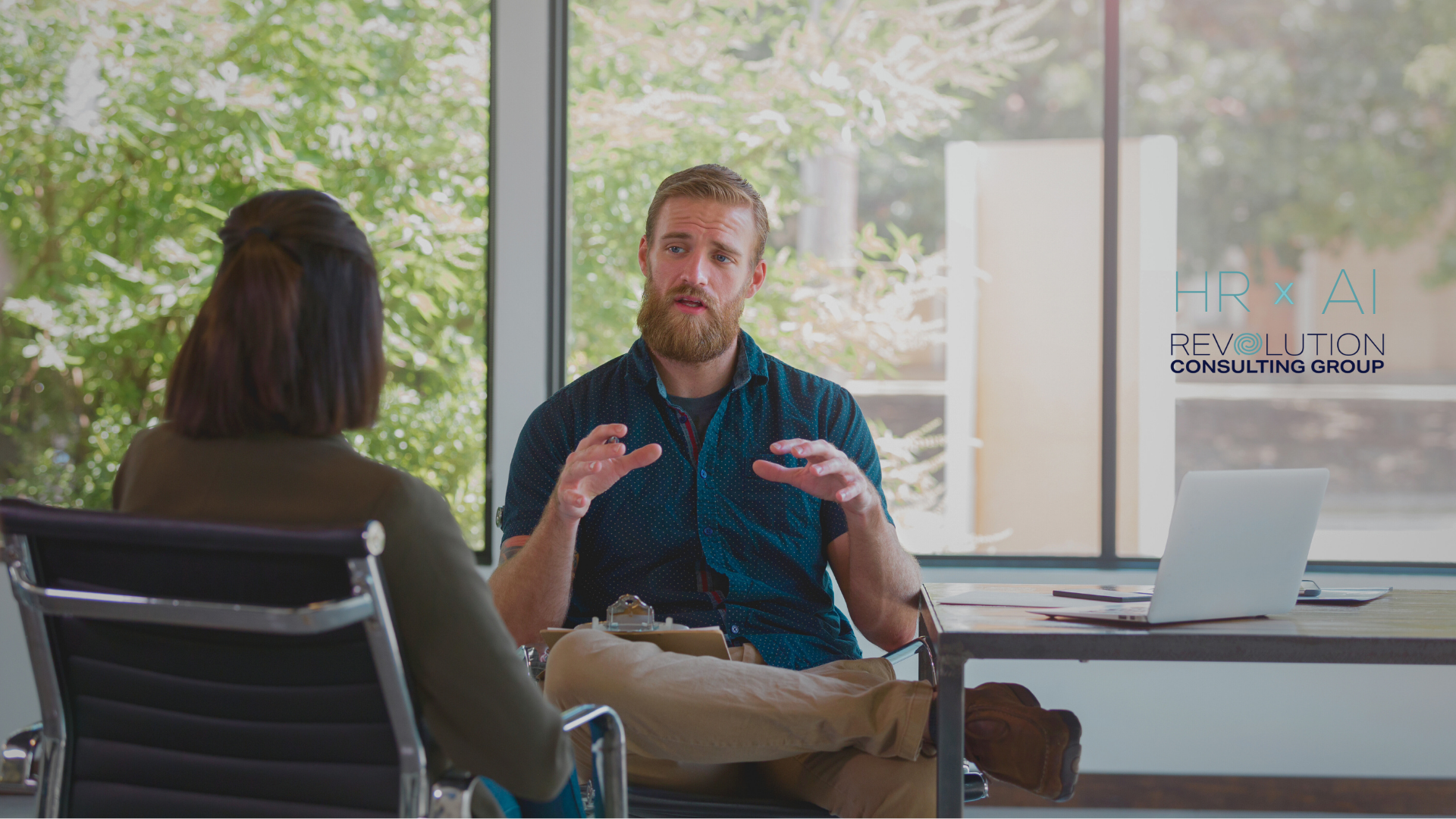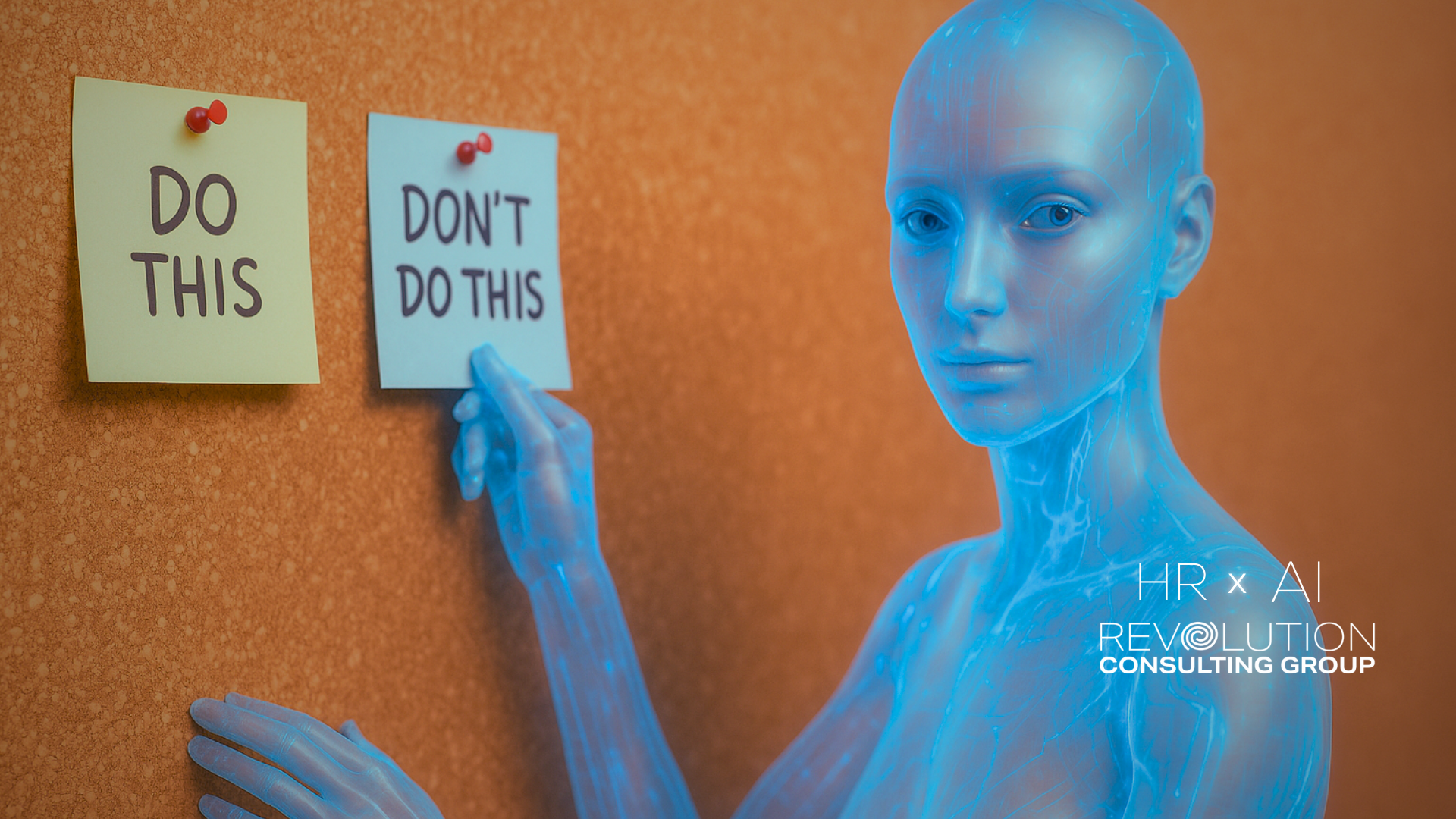
Revolution Consulting Group provides essential HR advice and services to small and medium-sized businesses throughout Australia.
Where We Are Located
On the beautiful NSW South Coast
QUICKLINKS
LATEST POSTS

By Sally Dillon
•
August 14, 2025
Most business owners don’t avoid HR issues because they don’t care. They avoid them because they don’t know how to start. What do I say to someone whose performance has dropped? How do I handle it when two staff members aren’t getting along? How do I give someone a warning without making it worse? These are the moments where AI, used thoughtfully, can give you structure, language, and the courage to act. without replacing the essential human touch that real leadership requires. And it’s not just leaders who benefit. AI can also support staff preparing for difficult conversations with their manager, whether it’s asking for help, speaking up about stress, or flagging that they’re feeling stretched or unsupported. It’s a tool that can help both sides of the table show up better. But let’s be clear: AI isn’t the answer. You are. It just helps you get unstuck. Why do people avoid difficult conversations? Behind most avoided conversations is fear. Fear of being disliked. Fear of not having the right words. Fear of breaking something that feels fragile. Fear of not being able to repair trust if things go wrong. And when we avoid the conversation, the issue doesn’t go away. It simmers. It spreads. It shows up in team dynamics, trust breakdowns, disengagement, or resentment. That’s where AI can quietly step in, not as a savior, but as scaffolding. A way to rehearse. To say the hard thing softly before saying it out loud. There’s a saying: Easy conversations lead to a hard life. Hard conversations lead to an easier one. Avoiding discomfort might feel safer in the moment, but it often builds into something far more painful later. When we face things early, with honesty and care, we create workplaces where trust grows, tension clears, and people feel safe to speak up. It’s not about being perfect. It’s about being present and willing. Here Are 3 Practical Ways AI Can Help You Face People Issues It Gives You a Starting Point Whether it’s a performance conversation, a team reset, or a difficult “I’m not coping” moment, AI can help you break through blank page syndrome. You still need to bring your leadership lens, but having a first draft is often the hardest part. This is structure, not strategy. It Helps You Frame Feedback Without Emotion AI can help you depersonalise and professionalise your message. That’s especially helpful when you’re feeling frustrated or overwhelmed. You can use it to explain what’s not working and what needs to change with clarity, while adding your human context and care. AI won’t write it perfectly, but it can give you a foundation to build on. It Supports Courageous Conversations With a few smart prompts, AI can help you structure a script using techniques like the GROW model (Goal, Reality, Options, Will). This isn’t just for leaders. Imagine a staff member preparing to ask for support without fear of seeming weak. AI can help them find the words. Courage goes both ways. Why Heart-Based Leadership Still Matters Most AI can’t read the room. It doesn’t see the tired eyes, hear the quiet shift in someone’s tone, or pick up on the tension between what’s said and what’s meant. It can’t show warmth, create psychological safety, or rebuild trust when it’s been shaken. Leadership is a heart-based skill. It’s human-first. It takes courage, emotional intelligence, and the ability to sit in discomfort without rushing to fix it. AI will give you language. You give it meaning. AI Can’t - and Shouldn’t - Replace You AI can help you prepare. But it can’t: Read the room Offer empathy Rebuild trust Notice someone’s shaking hands or tearful eyes Navigate a heated moment with calm, human authority Make value based decisions That’s leadership. And that’s your job. AI can only support and help you be prepared for the conversation. You have to have it. Takeaways: If You’ve Been Avoiding That Conversation, Try This... Use AI to generate a first draft—just to get it out of your head and into motion. Structure your message using a framework like GROW or SBI (Situation, Behaviour, Impact). Review it through a legal and values lens: Is it fair? Respectful? Aligned with policy? Practise it. Say it out loud. Get feedback if needed. Lead the conversation. Don’t outsource your courage. Or your care. Remember: Leaders set the tone. And silence is a tone too. Final Thoughts AI can’t feel discomfort. But it can help you move through it faster. It can’t sense fear—but it can give you the words to walk through it. Whether you’re preparing to give feedback, ask for help, or reset a team relationship—it’s time to stop avoiding and start leading.

By Sally Dillon
•
August 14, 2025
“Just ask ChatGPT.” It’s become the default advice for everything—from writing a recipe to managing staff issues. And while it might work for dinner ideas, when it comes to HR—especially in Australia—it can cost you thousands, damage your reputation, and land you in legal hot water. Why? Because AI isn’t trained on your policies. Or our Fair Work system. Or your obligations under the SCHADS, Retail, Clerks, or Manufacturing Awards. It’s trained on patterns. Not on legal precedent. Not on nuance. But more and more businesses are using free AI tools to: Get advice on pay rates or Award coverage Write termination letters Draft employment contracts Handle conflict and underperformance And they’re making expensive mistakes as a result. I recently had a potential client plugging the information I was providing them into AI—just to “check” if I knew what I was talking about. Then came the awkward (and somewhat heated) conversation when the AI tool gave them a different answer than I did. The heated part wasn’t on my end—it was the client who chose to trust good old Charlie Chat over my 20+ years of real-world HR and compliance experience. Let’s just say, Charlie Chat won’t be showing up beside them at a Fair Work hearing. I know tools like ChatGPT are incredibly convincing but that’s because they’re designed to be. They mimic confidence. They use professional language. But they don’t understand your legal risk, your workplace culture, or the impact of a poorly handled conversation. They don’t know how to read a tense pause in a meeting or recognise that an employee is struggling with burnout masked as underperformance. Real Mistakes, Real Consequences 🔻 Incorrect Pay Rates: A small business owner relied on ChatGPT to calculate casual pay for a retail worker. The AI didn’t factor in the minimum engagement period or weekend penalty rates. The business ended up owing nine months of backpay and faced a Fair Work audit after a complaint. 🔻 Unenforceable Contracts: A client copied and pasted a contract clause from an AI draft, thinking it sounded good. But the non-compete clause had no geographical scope and wasn’t relevant to NSW employment law. The employee left and immediately started a competing business - legally. 🔻 Flawed Termination Advice: An SME used AI to guide a dismissal. It missed key steps like formal warnings, offering a support person, and procedural fairness. The business owner was shocked to receive a general protections claim and had no proper records to support their version of events. Why This Happens Free AI tools like Claude, ChatGPT and others sound confident. That’s their design. But they don’t: ❌ Know current Award rates ❌ Verify Australian employment laws ❌ Understand Fair Work procedures ❌ Read emotional dynamics or workplace context And more importantly, they aren’t accountable if things go wrong. You are. In small businesses, it’s easy to think AI is the smarter, faster, cheaper option. You’re time-poor. You’re trying to get it right. And maybe you didn’t realise HR is actually a specific skill set you need help with - because isn’t it just about chatting to your people every now and then? Unfortunately, it’s not. HR is layered with nuance. It’s legal, yes, but it’s also emotional, relational, and strategic. And AI can’t lead with empathy, adapt to cultural dynamics, assess risk, or understand what truly keeps people engaged, safe, and supported. That doesn’t mean AI has no place in HR. Used with care, it can help you draft a job ad, map out onboarding steps, or summarise a policy. But when it comes to decision-making—especially involving real people, risk, or conflict - human judgment is non-negotiable. HR isn’t just about policies, it’s about people. And when AI gets it wrong, it’s not just a legal risk, it’s a leadership one. Trust gets shaken. Communication suffers. And people start to feel like they’re working for a machine, not a business that values them. 5 Questions to Ask Before You Use Free AI Advice: Would I trust this advice in front of FairWork representative, SafeWork Inspector or another third party? If not, don’t act on it. Have I checked this advice against current Australian legislation or Awards? If not, you’re flying blind. Does this situation require judgment, empathy, or leadership? AI can’t offer any of those. Am I clear on my legal obligations—not just “common sense”? AI doesn’t know your compliance context. If this goes badly, who’s responsible? You are. Not Charlie Chat. AI is a powerful tool, but it’s not your legal team, your HR manager, or your conscience. Final Thoughts AI will give you fast answers. But HR isn’t about speed - it’s about risk, relationships, and results. Use AI for admin and structure. Use a human for anything that carries weight, risk, or impact. You don’t need to fear AI, you just need to know where it belongs. Use it to make your systems smarter, not to replace your leadership. Because at the end of the day, AI doesn’t lead people. You do.